I am new to C++ and was trying to write a program that takes the lowest and the highest numbers in a vector, takes them away from the vector and proceeds to calculate an average with the rest of the numbers.
Now while I understand that I could do it after the numbers have been entered, I wanted to challenge myself and carry out these checks as the numbers were entered one by one. I was looking around but I couldn't find another person with the exact issue I am having (since I am using vector.end() - 1).
Below is my code and the error that it is giving me. Any guidance is much appreciated.
#include <iostream>
#include <iomanip>
#include <vector>
#include <algorithm>
#include <numeric>
#include <limits.h>
using namespace std;
typedef vector<int>::iterator iter;
int main() {
cout << "Please enter the series of scores: \n";
// Read numbers from the standard input
// and store them in a vector
vector<int> scoreVector;
int x = 0;
int count = 0;
// Assign the lowest possible value to the maximum possible integer so that any value entered initially will be lower that INT_MAX
int lowestValue = INT_MAX;
int highestValue = 0;
iter lowestValueIndex;
iter highestValueIndex;
// Every time a number is entered, the program checks to see if it meets the criteria for the lowest or highest number entered so far
while (cin >> x) {
scoreVector.push_back(x);
if (x > highestValue) {
highestValueIndex = scoreVector.end() - 1;
highestValue = x;
}
if (x < lowestValue) {
lowestValueIndex = scoreVector.end() - 1;
lowestValue = x;
}
}
// Calculate the vector size
auto n = scoreVector.size();
if (n > 2) {
cout << "\nThe lowest value is:" << lowestValue << "\nThe highest value is: " << highestValue << ". These values have been taken out." << '\n';
// Remove the two values from the vector
scoreVector.erase(lowestValueIndex);
scoreVector.erase(highestValueIndex);
// Calculate the average
auto average = accumulate(scoreVector.begin(), scoreVector.end(), 0.0) / n;
cout << "\naverage = " << average << '\n';
}
return 0;
}
